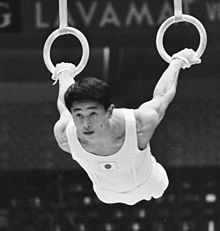Takashi Mitsukuri
Takashi Mitsukuri ( Japanese 三 栗 崇 , Mitsukuri Takashi ; born February 19, 1939 in Toyama Prefecture ) is a former Japanese gymnast . From 1960 to 1966 he won two Olympic gold medals and two world championships with the Japanese team.
Career
At the 1960 Olympic Games in Rome, there were three gymnasts in the Japanese gymnastics team: Nobuyuki Aihara , Takashi Ono and Masao Takemoto , who had won the silver medal behind the Soviet squad in 1956 . Yukio Endo , Takashi Mitsukuri and Shūji Tsurumi, however, were new to the team. This Japanese squad won the team title two and a half points ahead of the Soviet squad; with over thirteen points behind the Soviet squad, the Italian gymnasts received the bronze medal in front of their home crowd. Boris Schachlin won the individual ranking ahead of Takashi Ono and Juri Titow . In the next places were four Japanese gymnasts, the Yugoslav Miroslav Cerar and in ninth place Takashi Mitsukuri as the last of the Japanese involved. In the apparatus finals, to which six gymnasts were admitted, the Japanese were represented by three gymnasts apart from the rings. Mitsukuri reached the device finals on the pommel horse and on the ground and took fourth place on both devices.
Two years later at the Gymnastics World Championships in Prague Nobuyuki Aihara, Yukio Endo, Takashi Mitsukuri, Takashi Ono, Shūji Tsurumi competed together with Haruhiro Yamashita . In the team standings, the Japanese team won with one and a half points ahead of the Soviet gymnasts, the bronze medal went to the team from the host country as in 1960, in this case the team from Czechoslovakia. As with the Olympic victory in 1960, the victory at the World Gymnastics Championships in 1962 was the first victory for the Japanese squad in the history of the competition. In the individual finals on the pommel horse, Miroslav Cerar won ahead of Boris Schachlin in Prague, behind which Takashi Mitsukuri and the Chinese Yu Lifeng received the bronze medal.
In 1964 the Olympic Games took place in Tokyo. The Japanese team started with Yukio Endo, Takuji Hayata , Takashi Mitsukuri, Takashi Ono, Shūji Tsurumi and Haruhiro Yamashita, the team was coached by Masao Takemoto, who was still a member of the team in 1960. In the team competition, the Japanese gymnasts won two and a half points ahead of the Soviet team, while the German team won bronze. Yukio Endō was the first Japanese gymnast to win the Olympic Games in the individual ranking, followed by a tie between the Soviet gymnasts Wiktor Lissizki and Boris Schachlin and Shūji Tsurumi together to receive silver. Behind the Italians Franco Menichelli , Yamashita, Cerar and Hayata, Mitsukuri finished ninth as in 1960. As in 1960, Mitsukuri also reached the device finals on the ground, where he took fifth place, and on the pommel horse, where he was ranked sixth.
At the World Gymnastics Championships in 1966 Mitsukuri was a member of the Japanese squad for the last time at a major international championship. With Yukio Endo, Shūji Tsurumi and Haruhiro Yamashita, three other Olympic champions from 1964 belonged to the Japanese team, along with Takeshi Katō and Akinori Nakayama . In the team standings, the Japanese won by more than four points, but Mikhail Voronin won the individual standings . Mitsukuro won another individual medal at the end of his career: On the horizontal bar , he received the bronze medal behind his compatriots Nakayama and Endo.
Takashi Mitsukuri studied after his career at the German Sport University in Cologne . His wife Taniko Nakamura won the bronze medal with the Japanese team at the 1964 Olympic Games.
literature
- Volker Kluge : Summer Olympic Games. The Chronicle II. London 1948 - Tokyo 1964. Sportverlag Berlin, Berlin 1998, ISBN 3-328-00740-7 .
Web links
- Takashi Mitsukuri in the Sports-Reference database (English; archived from the original )
- Gymnastics World Championships on sport-komplett.de
Footnotes
- ^ Indication of the region of birth according to the Olympic database Sports Reference, according to Volker Kluge ( Olympic Summer Games. The Chronicle II. London 1948 – Tokyo 1964. Page 635, Note 347) Mitsukuri was born in Korea.
- ↑ Volker Kluge: Olympic Summer Games. Chronicle II. London 1948 – Tokyo 1964. Page 822, note 401
- ↑ Volker Kluge: Olympic Summer Games. Chronicle II. London 1948 – Tokyo 1964. Page 635, note 347
| personal data | |
|---|---|
| SURNAME | Mitsukuri, Takashi |
| ALTERNATIVE NAMES | 三 栗 崇 (Japanese) |
| BRIEF DESCRIPTION | Japanese artistic gymnast |
| DATE OF BIRTH | February 19, 1939 |
| PLACE OF BIRTH | Toyama prefecture |

